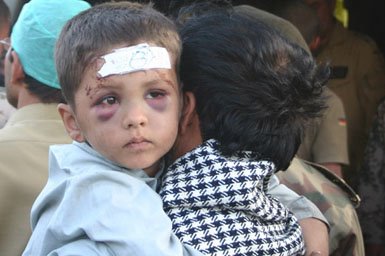
A father and son wait to board a helicopter to Islamabad. © UNHCR/B.Baloch
As winter closes in, survivors of the October 8 Pakistan earthquake are in danger of freezing to death without help from the world.
The earthquake is believed to have killed 55,000 people; among natural disasters in the last hundred years, that makes this event one of worst ten.Aid workers are scrambling to supply the millions of Pakistanis who have no food, water, shelter or medicine in the freezing temperatures of the Himalayas. Workers have resorted to rafts and pack mules to reach them, but helicopters, though costly, have proven the most useful.
"When the money runs out, the choppers stay on the ground and that's what's going to start happening in the next couple of days," said Robert Smith, financial expert at the United Nations' leading disaster-relief body, the Office for the Coordination of Humanitarian Affairs (OCHA). (Reuters AlertNet)
And aid is simply not getting through.
And potential donor countries just are not rising to the need. Pledges have been made for long term reconstruction, but people's needs are not getting support. Jo Leadbeater, Oxfam's Head of Advocacy, insists "we needed 30 times more than they pledged."Marc Joolen, Medicins Sans Frontieres's Operations Coordinator, flew over … to get some perspective on how much relief work had been done at the southern end of the quake's death zone in Pakistani Kashmir….
"It's crap -- there are hardly any tents distributed so far," he says as the helicopter swoops over ridge after ridge dotted with sloping tin roofs atop the rubble of caved-in walls that used to be houses. "It seems the higher you go the worse it gets…"
In places people run out waving white handkerchiefs, hoping the helicopter will bring salvation. Joolen tells the pilot not to go any closer for fear of blowing away the cotton and plastic sheets the destitute villagers are using for makeshift shelter. (MSF)
Not surprisingly some countries are doing more than others. Oxfam has created an interesting chart showing how much governments have pledged, as a percentage what their fair share of the UN's estimate of need suggests, according to each country's wealth. (Available as a pdf here.) Several countries have promised more than their fair share: Sweden (298%); Luxembourg (211%); Netherlands (135%); Denmark (119%). Others are contributing respectably: Canada (90%); Norway (84%); United Kingdom (79%); and Australia (63%). And some very rich countries have responded pitifully: Japan (16%); Germany (14%); the United States (9%); and France (0%).
Individuals who can do their little bit have numerous good agencies to choose from. Some of my favorites:
- and Doctors without Borders,who make a point insisting that donations not be earmarked to specific disasters.
No comments:
Post a Comment